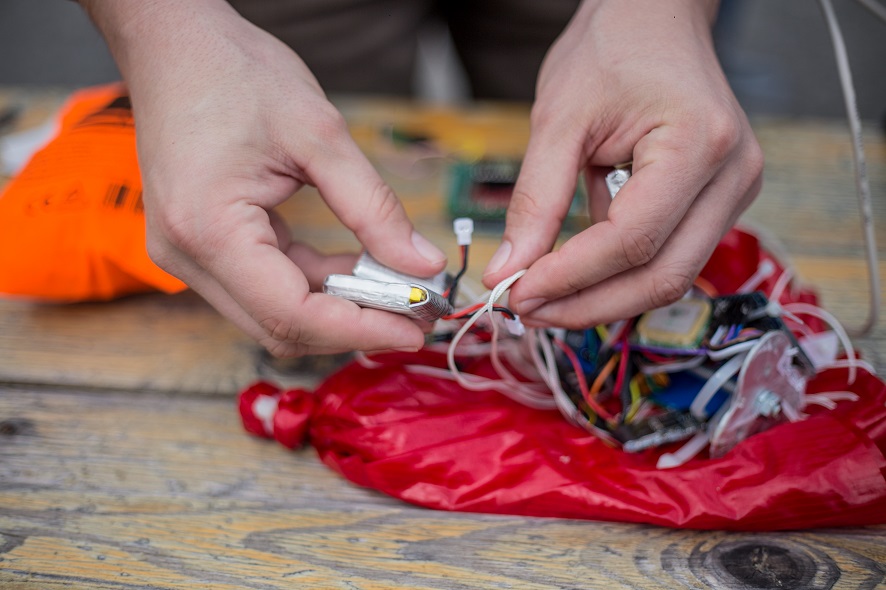Who can build the best satellite in the size of a soda can? That’s the challenge behind the international CanSat competition. Thanks to ESERO Austria, the educational office of the European Space Agency (ESA) at the Ars Electronica Center, the first competition in Austria took place in April 2018: On an airfield near the Austrian-German border, a rocket from the TU Vienna Space Team lifted the three youth teams’ satellites high up in the air before they carried out their primary and secondary missions during the descent phase.
Team EcoSat, which consisted of Klemens Fischl, Maximilian Hierner, Florian Leonhartsberger, Alexander Fraisl and Tobias Strondl of HTL Ybbs, emerged as the winner and went on to participate in the Europe-wide competition in the Azores with their mini-satellite, the CanSat. Klemens Fischl and Stefan Zauner, the team’s teacher coach at HTL Ybbs, gave us their impressions of the trip in this interview.
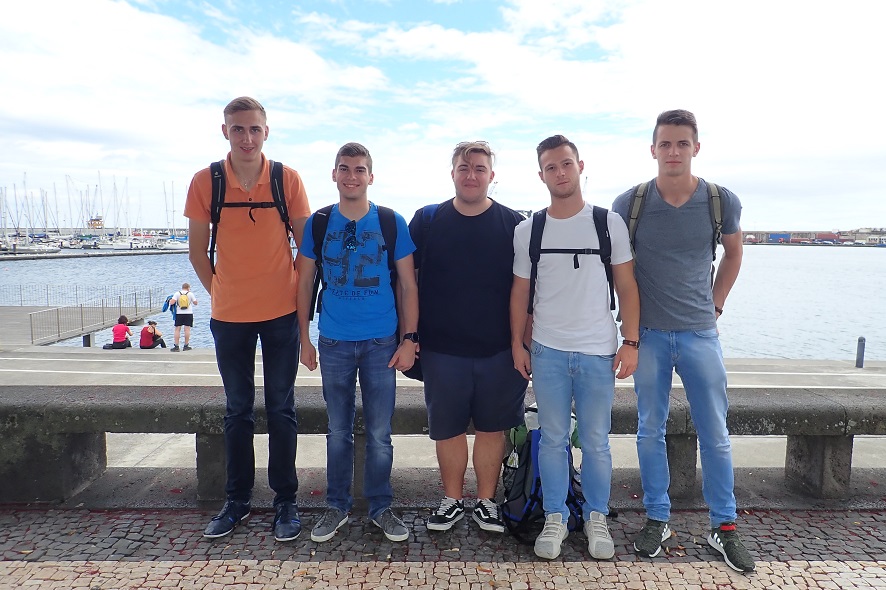
Credit: Team EcoSat
Klemens, what did you expect from the European CanSat competition?
Klemens Fischl: We traveled to the European CanSat competition with very high expectations. On one hand, we hoped our hard work on our very own CanSat would earn us one of the top places, on the other we were excited to travel to a place we probably wouldn’t be visiting again anytime soon.
How did your time in the Azores go? What experiences did you have?
Klemens Fischl: Our time in the Azores flew by. After the long trip there, we were all really exhausted the first day and after dinner and final preparations for the next day, we all hurried to bed. The second day was all planned out with drop tests, technical inspections, and an opening presentation. Thanks to our thorough preparation in Austria, we were able to spend the whole day preparing for the opening presentation. We got a little shock during the drop tests when wind blew the drone out of sight, along with our dummy and parachute. Luckily, we had a parachute in reserve. On the third day, the highlight of the event took place: the rocket launch. Our CanSat was carried up about 800 m and thrown out. We were receiving data throughout the fall. The strong wind blew our CanSat off course by a few meters, but thanks to our GPS module we were able to find it again quickly. On the fourth day we had the final presentation and the award ceremony. That gave us a chance to learn about some very interesting ideas from other teams. Unfortunately, we did not win a prize. The jury’s assessment was unfortunately not publicized and there was very tough competition from the other teams. That evening, there was some music at the hotel, and all the participants got to know each other better and had a nice evening. We rounded off our trip on the fifth day with a tour of the island, a visit to the ESA stations in the Azores, and the flight home.
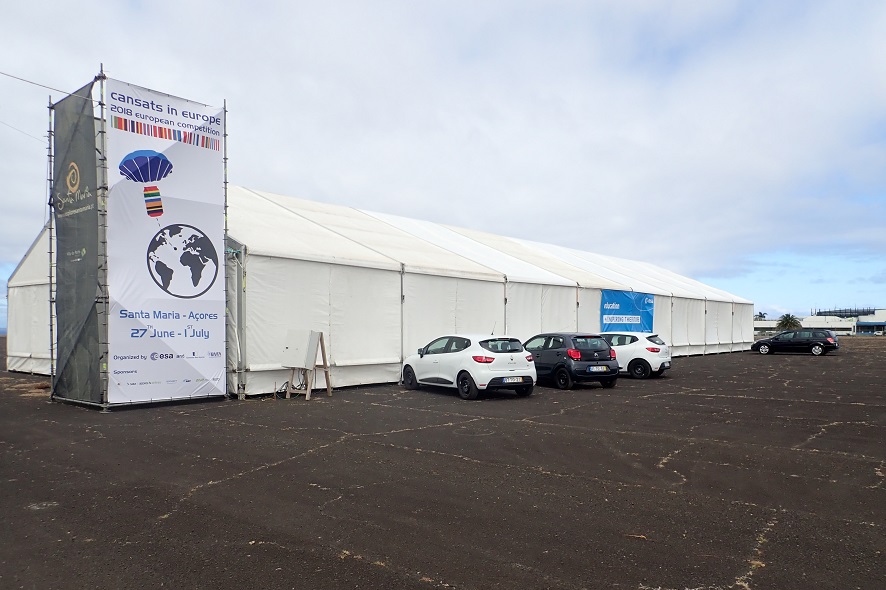
Credit: Team EcoSat
What did you learn by participating in the Austrian competition and then the European one?
Klemens Fischl: We learned a lot from both competitions and would like to express our thanks for having the opportunity to take away these experiences. For example, planning a “mission” where you have to think everything through, from the sturdiness of the can to how the data should be transmitted. Or working together as a team and reacting to problems that come up. Another important experience we gained was meeting many different Europeans our age and seeing the differences between us as well as the many things we have in common.

Credit: Team EcoSat
Mr. Zauner, as a teacher in a coaching role, what did you think of the Austrian and European competitions?
Stefan Zauner: In my experience, both competitions were well organized. The Austrian ESERO Team and the Space Team from TU Vienna had put a lot of effort into the preparations in order to have an event that was enjoyable and ran smoothly. Those days in Linz and Schärding were very exciting for us! The climate was productive, encouraging and challenging. We received good support from various sides to help the students reach their goals. Once again, sincere thanks to them for the really successful implementation of the Austrian contest!
The ESA’s CanSat Contest took place in the Azores this year. The preparatory work was very intensive. After a long trip there on four separate flights, we landed on the island of Santa Maria. We got a friendly reception at the airport and were accompanied to our hotel. The next day, the students had a chance to do some final work. The CanSat and an overview of the mission were presented to the jury; on that day there were also technical inspection and various drop tests.
The next day, the rocket launches were planned after some safety instructions. Due to strong wind, there was a lot tension on our team. We decided to use the smallest possible parachute to minimize the risk of drifting too far away. Right before the countdown, the tension was really unbelievably high. The rocket launch itself worked well, but the carrier rocket quickly disappeared from sight in a layer of low-lying clouds. To our great relief, the students received measurement data from the CanSat at the ground stations during ascent and descent. Because of the poor visibility, they got help from an RSSI meter for guiding a receiving antenna. All the uncertainties, the pressure of having worked so long on a project, the long trip and then the critical moments… and then it all turned out ok… that was quite an emotional roller coaster. Back in the tent, we got to work again. The students evaluated the data and prepared the final presentation for the jury and audience the next day.
On the last day, we were able to visit the RAEGE VLBI base for gathering geodynamic data with a radio telescope and a gravimeter. I personally found that visit very interesting. We were also allowed to look around the ESA Tracking Station. This is where the telemetry data used to be received for ESA missions from rocket launches from the Kourou spaceport in French Guyana. We also enjoyed a bus tour around the island of Santa Maria. We are very thankful for the extraordinary opportunity to participate in this trip!
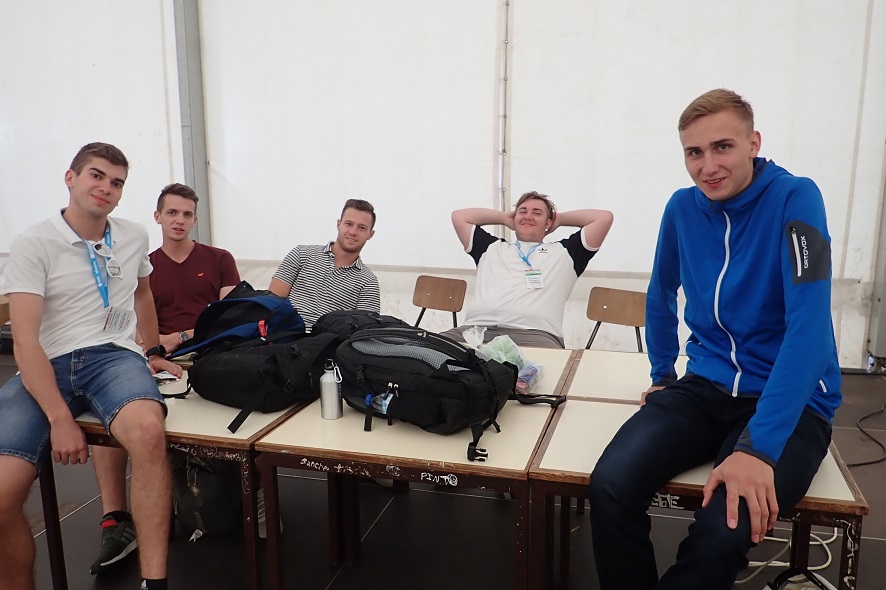
Credit: Team EcoSat
What value do you think students get from participating in the European competition?
Stefan Zauner: At the ESA CanSat Contest, students have an opportunity to implement high-level technical projects. A wide variety of specialist disciplines can play into this, depending on your preferences. Because the range of possible missions is so multifaceted, the development activities could go in many different directions.
Our student team applied skills in project management, software and hardware development, science, and producing reports in English. They also used the skills they acquired in 3D design, databases, web design, presentation technology, and public relations. From my point of view, all of this increased their strength as a team as well as the independence of the individual members. Every team member did valuable work that flowed into a great overall project.
The value for me is also in seeing how such varied disciplines can come together into an exciting project. I think another possible advantage for the future graduates is that they will be able to mention the CanSat Contest in their CVs when they apply for jobs.
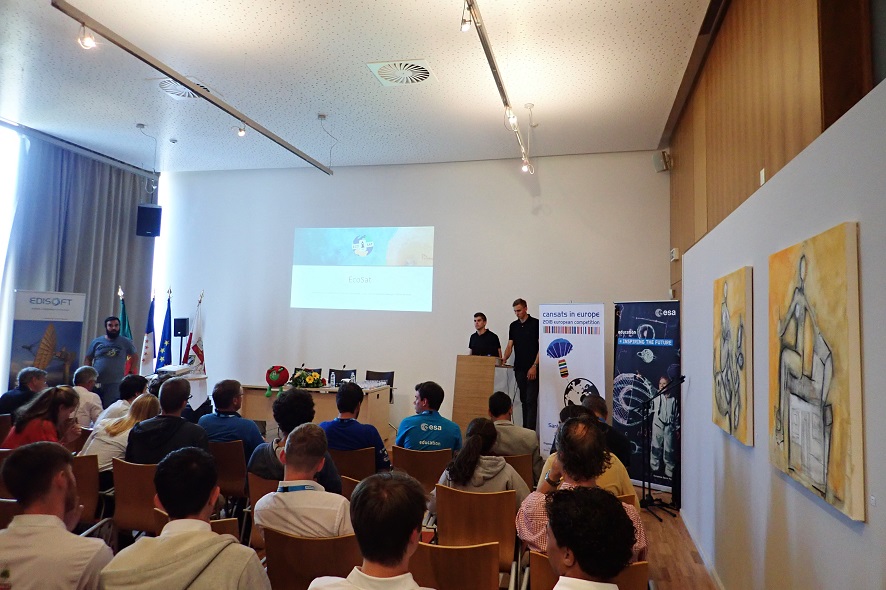
Credit: Team EcoSat
Were you able to learn something too?
Stefan Zauner: I was also able to learn a lot. Because of the different specialist disciplines involved, there was a lot that was new even to me, for example with the development of hardware and also software. The most important lesson was that it makes sense to implement redundancy, especially in data transfer and storage. Designing the most compact and stable mechanism possible for the CanSat was also a good learning experience.
I would like to extend my sincere thanks again to ESERO Austria, the Ars Eletronica Center, the FFG, the TU Space Team, the Austrospace, the ENTA Team in the Azores and everyone involved at ESA for these two extraordinary events and for the confidence placed in our students!
Want to learn more about the CanSat Competition? You can read an interview with former participants here, see a visit to the rocket-building team of the TU Vienna Space Team here, in the picture-filled Feature there are videos and impressions from the Austrian Competition 2018, and here you can read more about the team’s visit to RUAG Space AG.
This year another CanSat competition will take place in Austria – Applications will be accepted until November 23, 2018. You can find all the information on the ESERO Austria website.
To learn more about Ars Electronica, follow us on Facebook, Twitter, Instagram et al., subscribe to our newsletter, and check us out online at https://ars.electronica.art/news/en/.
